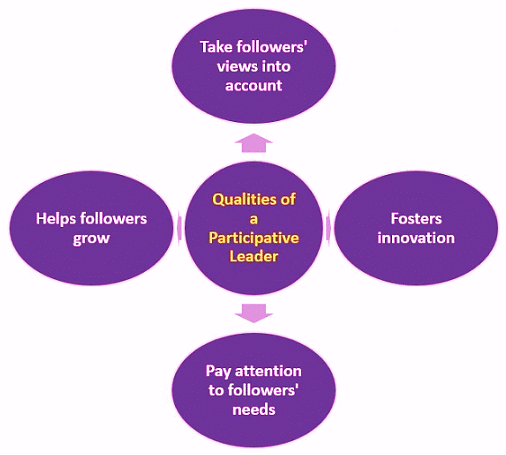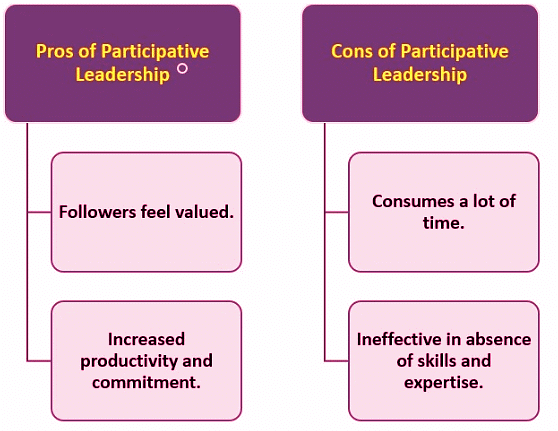Leadership and Participatory Management | Psychology for UPSC Optional (Notes) PDF Download
| Table of contents |

|
| Introduction |

|
| Leadership Styles |

|
| What is Participative Leadership? |

|
| Qualities of a Participative Leader |

|
Introduction
In today's dynamic and ever-changing world, traditional top-down approaches to leadership are being challenged. The scientific community agrees that success in education and organizations cannot be achieved solely through bureaucratic structures and hierarchical relationships. Instead, decentralized structures of authority and participative leadership have emerged as effective strategies for driving growth, innovation, and employee satisfaction. Participative leadership, defined as the shared influence in decision-making between leaders and subordinates, emphasizes the distribution of power and the involvement of team members. This article explores the meaning, advantages, disadvantages, and qualities of participative leaders, highlighting their significance in fostering change-oriented organizational citizenship behavior.

Leadership Styles
The organization's utilization of human and financial resources is greatly influenced by the leadership style employed, as stated in the literature. The literature suggests that leadership styles within an organization can impact its corporate values, productivity, and overall performance. Daniel Goleman identifies six distinct types of leadership, including coaching, pacesetting, affiliative, authoritative, and coercive. Coercive leadership involves compelling followers to execute the leader's instructions, while authoritarian leadership entails providing explicit directions for carrying out specific tasks. Affiliative leadership focuses on cultivating harmonious relationships between a leader and their followers. Participative leadership involves granting followers the opportunity to participate in organizational decision-making, fostering a higher level of commitment.
What is Participative Leadership?
Participative leadership utilizes a democratic approach to inspire followers, encourage their commitment to tasks, and foster the generation of innovative ideas. Leaders in this style actively consider their followers' suggestions to make informed decisions. They prioritize the needs and input of their followers by actively seeking feedback and creating a supportive environment. It is crucial for all members of the organization to feel empowered and have a sense of voice, as it motivates them to exert greater effort. Through the shared authority in decision-making, leaders and followers stand on equal ground, contributing to the creation of a cohesive team dynamic. Therefore, selecting proactive followers in the decision-making process is essential. The decision-making process itself should maintain high quality to ensure participant satisfaction and the development of their skills. Effective communication enables followers to make informed judgments, and leaders go the extra mile to involve and engage their followers. Building trust is a critical aspect for leaders, as it enables followers to feel comfortable expressing their thoughts and contributing original ideas. This leadership style promotes a bottom-up decision-making approach and cultivates harmony within organizations.
Qualities of a Participative Leader
- Participative leaders actively seek input from their workforce, engage in consultations, and consider their perspectives.
- Participative managers foster a culture that encourages staff members to explore new opportunities and engage in continuous learning through the collection, sharing, and application of information.
- Participative leaders play a vital role in promoting innovation and creating opportunities for organizational learning.
- A proficient participative leader excels in effective communication and attentively addresses the needs of their followers.
- Participative leaders involve their followers in the process of setting realistic goals and effectively communicate the priorities to them.
- They assist followers in skill development and provide them with the necessary resources to succeed.

Advantages of Participative Leadership
The participative leadership approach is often praised for its ability to enhance employee engagement. Participative leaders actively seek and incorporate feedback from their followers. When followers perceive that their input and work are valued by the leader, it fosters a strong sense of worth and job satisfaction. The motivation and commitment of participants in participative leadership are heightened, leading to increased productivity in achieving goals. Sharing opinions and providing guidance makes individuals feel valued, fostering a greater sense of belonging within the organization compared to merely performing routine tasks. Engaging in proposing new products or improving existing ones helps individuals develop their thinking abilities. Although obtaining feedback from followers may take time and decision-making processes within companies may be slower, the likelihood of making the right choices is significantly increased. Moreover, the motivation and dedication of followers are elevated. Individuals who feel free to express their opinions tend to generate more creative solutions to problems and exhibit better resilience in facing life's challenges.
Disadvantages of Participative Leadership
- Despite the numerous benefits of the participative leadership approach, there are certain challenges associated with it. The human-centered nature of this style, particularly the emphasis on gathering feedback from followers, requires careful consideration. One major challenge is the time it takes to involve followers in the decision-making process. Leaders must invest time in explaining the problem at hand or the available options to ensure that followers possess the necessary knowledge to make informed judgments. Allowing followers sufficient time to absorb the information, develop ideas, and present them to the leader is crucial.
- Another challenge arises when followers lack the required skills, expertise, or information to contribute meaningfully. In such cases, leaders may need to invest additional time in assessing their followers and providing them with necessary training to ensure their meaningful participation.
- Furthermore, maintaining harmony and cooperation among team members while working towards a common objective can be time-consuming and effort-intensive. Conflict may arise during group projects as individuals share diverse views and engage in debates.
- Additionally, there is a risk of participative leaders becoming overly dependent on their followers when it comes to decision-making. This can undermine the leader's ability to make effective decisions autonomously.
- Overall, while the participative leadership approach brings several advantages, leaders must navigate these challenges to ensure its successful implementation.

Conclusion
Organizations exhibit variations in terms of owner and employee behavior, as well as their perceptions of the most effective leadership styles. While many individuals express a preference for democracy and participative leadership within their organizations, it does not necessarily guarantee increased productivity. Since there is no universally comprehensive approach, it is difficult to declare any one leadership style as the absolute best. However, there is a growing trend towards embracing more participative leadership in organizations today. To foster a harmonious workplace, it is crucial to address the demands and expectations of employees. People thrive in environments where they can showcase their talents and derive satisfaction from their work. Research suggests that some leaders may be reluctant to invest time in attending to the needs of their workforce. However, it is important for leaders to recognize that engaging with their employees can ultimately save time and enhance their motivation to perform at a high level, resulting in a more profitable business.
|
160 videos|215 docs
|














